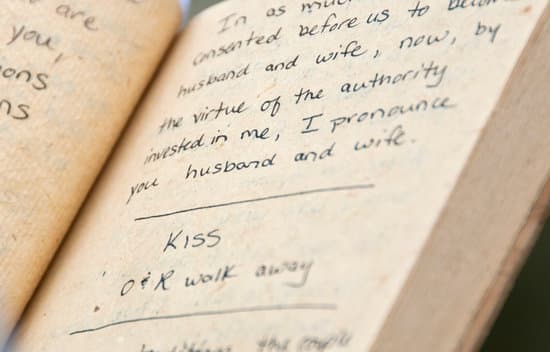Who goes to a wedding rehearsal? The purpose of a wedding rehearsal is to ensure that everyone involved in the ceremony knows their role and is clear on what needs to happen. It’s an opportunity for the bride, groom, and the wedding party to practice the procession and recession, as well as any readings or ceremonial elements.
Typically, a wedding rehearsal involves not only the bride and groom but also the wedding party, family members, officiant, and sometimes special guests or VIPs. Each of these groups plays a crucial role in making sure the ceremony runs smoothly on the big day.
The bride and groom are central figures in the wedding rehearsal, leading the procession and recession and practicing any ceremonial activities they need to perform. It’s important for them to be present at the rehearsal so that they can guide everyone through their roles. In addition, they may have specific ideas or preferences for how certain aspects of the ceremony should be carried out.
Who Typically Attends a Wedding Rehearsal
The wedding rehearsal is a crucial part of the wedding process, allowing the key players to familiarize themselves with their roles and responsibilities. But who typically attends a wedding rehearsal? The answer can vary based on a number of factors, but there are some common participants that you can expect to see at most wedding rehearsals.
First and foremost, the bride and groom will be in attendance at the wedding rehearsal. This allows them to practice their movements and get comfortable with the layout of the venue. The bridal party, including bridesmaids, groomsmen, ushers, and any other attendants, will also be present at the rehearsal. This gives them an opportunity to understand their roles in the ceremony and familiarize themselves with any special tasks or responsibilities they may have.
In addition to the bridal party, family members of the couple often attend the wedding rehearsal. Parents of the bride and groom are typically present, as well as any siblings or close relatives who may have special roles in the ceremony. The officiant will also play a key role in the rehearsal, guiding the participants through the order of events and ensuring that everyone understands their cues and responsibilities.
| Participant | Role |
|---|---|
| Bride and Groom | Practice movements, familiarize with venue |
| Bridal Party | Understand roles in ceremony |
| Family Members | Supportive presence with potential special roles |
| Officiant | Guides participants through order of events |
The Role of the Bride and Groom in the Rehearsal
The bride and groom play a crucial role in the wedding rehearsal, as it is their opportunity to ensure that everything runs smoothly on the big day. During the rehearsal, the couple will typically work with the officiant to practice their vows, exchange of rings, and any other rituals or ceremonies that are part of their wedding. They may also take this time to walk through the processional and recessional with their wedding party and family members.
In addition to practicing the ceremony itself, the bride and groom are also responsible for communicating with their wedding party about any specific roles or responsibilities they may have during the ceremony. This can include things like distributing programs, holding onto the rings, assisting with any readings or performances, or even just providing moral support for the couple.
Furthermore, the bride and groom may use this time to make any final decisions or adjustments to their ceremony plan based on how things go during the rehearsal. For example, they might decide to change up the order of some elements, adjust where certain members of their wedding party stand during the ceremony, or make any other necessary tweaks to ensure that everything goes off without a hitch on their actual wedding day.
The Bridal Party and Their Involvement
When it comes to the wedding rehearsal, the bridal party plays a crucial role in ensuring that everything runs smoothly on the big day. The bridal party typically consists of the maid of honor, bridesmaids, best man, and groomsmen. These individuals are not only there to support the bride and groom emotionally but also play a key role in the logistics of the wedding.
During the wedding rehearsal, the bridal party is responsible for understanding their specific roles and responsibilities. This may include walking down the aisle, standing at certain points during the ceremony, holding bouquets or rings, and participating in any special rituals or customs. It is important for the bridal party to pay close attention during the rehearsal so that they are well-prepared for their duties on the actual wedding day.
In addition to their logistical responsibilities, members of the bridal party also serve as an emotional support system for the bride and groom. They are there to offer encouragement, help alleviate pre-wedding jitters, and ensure that everything goes off without a hitch. Overall, the bridal party members play a vital role in making sure that the wedding ceremony is a beautiful and seamless experience for everyone involved.
The Family Members and Their Participation
When it comes to a wedding rehearsal, family members play an important role in ensuring that everything runs smoothly on the big day. The participation of family members in the wedding rehearsal is crucial for creating a cohesive and well-executed ceremony. This section will explore the different ways in which family members can be involved in the rehearsal process.
Parents of the Bride and Groom
The parents of the bride and groom often have important roles during the wedding ceremony, so their presence at the rehearsal is vital. They may be involved in seating arrangements, processional and recessional cues, as well as any special rituals or traditions that involve their participation. It is essential for them to attend the rehearsal to ensure they are familiar with their responsibilities and know where to be when certain moments occur.
Siblings and Close Relatives
Siblings and close relatives of the bride and groom may also have specific roles or duties during the wedding ceremony. This could include readings, musical performances, or other tasks that require coordination with the rest of the wedding party. Their attendance at the rehearsal allows them to practice their parts and understand how they fit into the overall flow of the ceremony.
Extended Family Members
In some cases, extended family members may also play a part in the wedding ceremony. Whether it’s as ushers, greeters, or participants in cultural or religious customs, their involvement should not be overlooked. Attending the rehearsal gives them an opportunity to familiarize themselves with their roles and make any necessary adjustments before the actual wedding day.
Overall, including family members in the wedding rehearsal ensures that everyone understands their responsibilities and feels confident in their contributions to this special event. Whether it’s parents guiding guests to their seats, siblings performing special readings, or extended family members participating in cultural traditions, their presence adds depth and meaning to the celebration of love.
The Officiant and Their Role in the Rehearsal
Leading the Rehearsal
The officiant holds a crucial role during the wedding rehearsal as they are responsible for leading the ceremony run-through. This includes guiding the bride, groom, and other members of the wedding party through their cues and roles during the ceremony. The officiant will typically lead a brief discussion at the beginning of the rehearsal to outline the order of events and clarify any questions or concerns from the group.
Providing Guidance
During the rehearsal, the officiant will provide guidance on where everyone should stand, when to walk down the aisle, and how to perform any ceremonial elements such as lighting candles or exchanging rings. They may also offer advice on proper etiquette and behavior during the ceremony to ensure everything runs smoothly on the big day.
Finalizing Ceremony Details
In addition to overseeing the rehearsal itself, the officiant plays a key role in finalizing details for the wedding ceremony. This may involve discussing any specific vows or readings that will take place, as well as ensuring that any special requests from the couple are taken into account.
Overall, it is essential for not only bride and groom but also other members who goes to a wedding rehearsal to pay keen attention to all instructions given by officiant so that nothing goes wrong during actual wedding ceremony since this can help in minimizing mistakes when it really matters most.
Special Guests and VIPs at the Wedding Rehearsal
The wedding rehearsal is not only for the bride, groom, and bridal party, but it also involves special guests and VIPs who play significant roles in the wedding. Here are some of the special guests and VIPs who typically attend a wedding rehearsal:
1. Parents of the Bride and Groom: It is customary for the parents of the bride and groom to attend the wedding rehearsal. They often have specific roles during the ceremony, such as walking down the aisle or giving a speech, so it is essential for them to be present during the rehearsal.
2. Grandparents: If grandparents have been given special roles in the wedding, such as being part of the processional or lighting a unity candle, they are usually invited to attend the rehearsal to ensure they understand their responsibilities.
3. Close Family Members: Siblings, close cousins, or other family members who are not part of the bridal party may also be invited to attend the wedding rehearsal if they have specific duties during the ceremony.
It is important for these special guests and VIPs to attend the wedding rehearsal in order to ensure that everyone understands their role in making the wedding ceremony run smoothly. The presence of these individuals can help alleviate any confusion or uncertainty about their responsibilities on the big day.
Proper Etiquette for the Wedding Rehearsal
When it comes to wedding rehearsals, there is a certain etiquette that should be followed to ensure that everything runs smoothly and everyone feels included. Here are some tips on proper etiquette for the wedding rehearsal:
1. RSVP: Just like with the wedding itself, it’s important for those who are invited to the rehearsal to RSVP in a timely manner. This allows the couple to plan accordingly and ensures that there will be enough food, drinks, and seating for everyone.
2. Punctuality: It’s crucial for all attendees of the rehearsal to arrive on time. The couple, as well as their wedding planner or coordinator, will likely have a timeline for the rehearsal, and being late can disrupt this schedule.
3. Respectful Behavior: The wedding rehearsal is a time for everyone involved in the wedding to come together and practice for the big day. It’s important to show respect towards the couple, their families, and each other throughout the rehearsal process.
Following these etiquette guidelines will help ensure that the wedding rehearsal goes smoothly and creates a positive experience for everyone involved.
When it comes to who goes to a wedding rehearsal, it’s not just limited to the bride and groom and their immediate family. There are several key individuals who play important roles in both the ceremony and reception – they are also typically expected to attend the rehearsal in order to walk through their specific responsibilities on the big day.
Other Important Members of the Wedding Party Attending the Rehearsal
In addition to the bride, groom, bridal party, family members, officiant, and special guests, there are other important members of the wedding party who also attend the rehearsal. These individuals play a crucial role in ensuring that everything runs smoothly on the big day. This includes the wedding planner or coordinator, musicians or DJ, photographer and videographer, and anyone else who will be directly involved in the ceremony and reception.
The wedding planner or coordinator is essential in making sure that all logistics are covered during the rehearsal. They will work closely with the couple to finalize any remaining details and ensure that everyone knows their roles and responsibilities. The musicians or DJ also need to be present at the rehearsal to familiarize themselves with the venue and schedule for the ceremony and reception.
Additionally, it is important for the photographer and videographer to attend the rehearsal so they can scout for the best angles and lighting for capturing those special moments. This also gives them an opportunity to coordinate with the officiant and understand any restrictions or guidelines for taking photos or videos during the ceremony.
Overall, having these key members of the wedding party present at the rehearsal ensures that everyone is on the same page and can address any potential issues before the actual event. Their participation helps to create a seamless experience for not only the couple but also their loved ones who are there to celebrate this joyous occasion.
Frequently Asked Questions
Who Usually Goes to a Wedding Rehearsal?
The primary people who attend a wedding rehearsal are the bridal party, including the bridesmaids, groomsmen, and often close family members of the bride and groom. Additionally, the officiant and any readers or performers may also attend to practice their roles.
Who Is Invited to the Wedding Rehearsal?
Typically, those invited to the wedding rehearsal include not only the bridal party and close family members but also any individuals who will have a specific role in the ceremony. This could include ushers, readers, performers, and anyone else involved in the wedding proceedings.
Do All Wedding Guests Go to Rehearsal Dinner?
Generally, not all wedding guests are invited to the rehearsal dinner. The dinner is usually limited to those closely involved in the wedding ceremony itself, such as the bridal party, immediate family members, and possibly out-of-town guests. It’s an opportunity for close friends and family to come together before the big day.

I have been involved in marriages for over 20 years helping couples and singles understand more about them.





